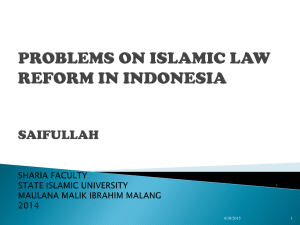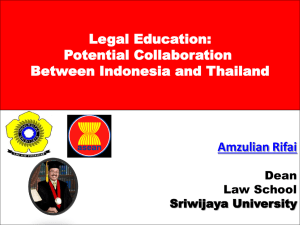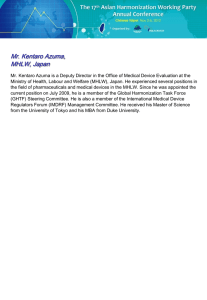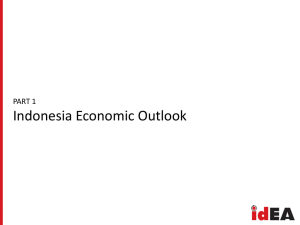environmental law system in indonesia to adapt climate change
advertisement
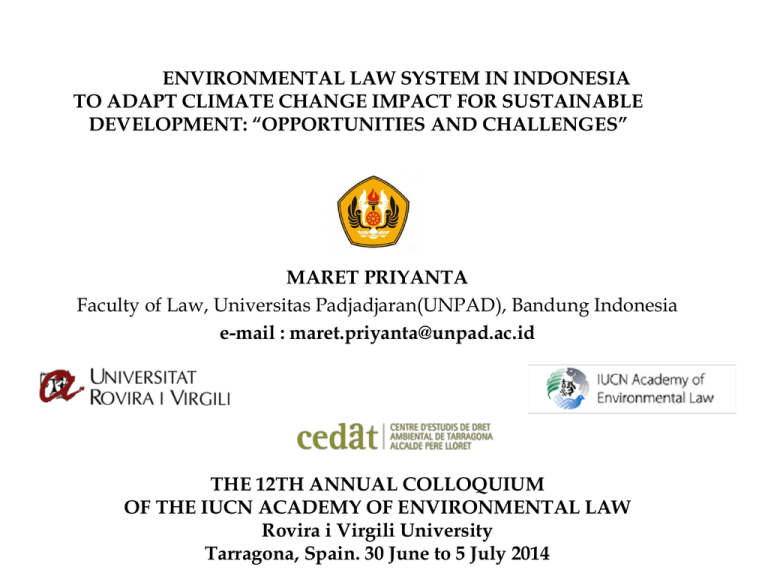
ENVIRONMENTAL LAW SYSTEM IN INDONESIA TO ADAPT CLIMATE CHANGE IMPACT FOR SUSTAINABLE DEVELOPMENT: “OPPORTUNITIES AND CHALLENGES” MARET PRIYANTA Faculty of Law, Universitas Padjadjaran(UNPAD), Bandung Indonesia e-mail : maret.priyanta@unpad.ac.id THE 12TH ANNUAL COLLOQUIUM OF THE IUCN ACADEMY OF ENVIRONMENTAL LAW Rovira i Virgili University Tarragona, Spain. 30 June to 5 July 2014 BACKGROUND Source : http://sujarman81.files.wordpress.com/2011/08/peta-indonesia-bagus-besar.jpg Indonesia is an archipelago state in South East Asia. Volcanic mountain range from South to East (most island). Natural resources (marine, forestry, mining, biodiversity, etc) Impacts of the Climate Change to Indonesia. (human and other life form, business activity, etc) LEGAL BASIS CLIMATE CHANGE IN INDONESIA UNITED NATIONS FRAMEWORK CONVENTION ON CLIMATE CHANGE (UNFCCC) 1992 KYOTO PROTOCOL TO THE UNITED NATIONS FRAMEWORK C'ONVENTION ON CLIMATE CHANGE 1997 • RATIFICATION (NATIONAL LAW No. 6, 1994) • RATIFICATION (NATIONAL LAW No. 17, 2004) Indonesia bound by the international convention on the climate change Transform into National Law; Based on Kyoto Protocol (international law) , Indonesia has no obligation to reduce emission; State Responsibility in the constitution (..to protect present and next generation) INDONESIAN POLICY CONCERNING CLIMATE CHANGE Speech President Republic of Indonesia Susilo Bambang Yudhoyono concerning Climate Change in meeting G-20 di Pittsburgh September, 25 2009 : “ We (Indonesia) have to move forward based on the principle of “common but differentiated responsibilities and respective capabilities”. Both developed and developing nations must do more and do away with “business as usual” mentality. Developed nations must take the lead, but developing nations must also seriously do their part. My last point is on what Indonesia has done and what we will do because we also want to be part of the solution. Indonesia of course faces problems and challenges in our national development: growth, unemployment, poverty, infrastructure building, education and health care. But we have decided and established a National Climate Change Action Plan with the targets of 2020 and 2050. We are devising an energy mix policy including LULUCF (Land Use, Land Use Change, and Forestry) that will reduce our emissions by 26 percent by 2020 from BAU (Business As Usual). With international support, we are confident that we can reduce emissions by as much as 41 percent. This target is entirely achievable because most of our emissions come from forest related issues, such as forest fires and deforestation” Percentage of “Business As Usual (BAU) and International Support” to Reduce Emission Business Activity/ Sector Peatland/ Gambut Waste Lahan Action Plan Emission Reduction Plan (Gigaton CO2e) 26 % 15 % (Total 41 %) 0.28 0.057 Forest and Land Fire Control 0.048 0.030 Waste Management and Integrated Waste Management in Urban Forestry 0.392 0.310 Forest Fire Control, Combating Illegal Logging, Deforestation Prevention and Community Participation. Agriulture 0.008 0.003 Intro low-emission rice varieties, irrigation water efficiency, use of organic fertilizers Industry 0.001 0.004 Energy efficiency, use of renewable energy Transportation 0.008 0.008 The use of biofuels, engines with higher fuel efficiency standards, improving TDM, the quality of public transport Energy 0.030 0.010 Demand side management, energy efficiency, developing renewable energy Sumber : Indonesia Environmental Status, 2009, Ministry of Environment Republic of Indonesia THE ISSUES CONCERNING CLIMATE CHANGE IN INDONESIA How The Perspective and Policy Of Indonesian Government To Mitigation and Adaptation of Climate Change Impact from State Responsibility principles? How Implementation of Regulation Concerning Climate Change In Indonesia including the constraints and barriers and how the connection between it to Support Sustainable Development? Source : http://sujarman81.files.wordpress.com/2011/08/peta-indonesia-bagus-besar.jpg ENVIRONMENTAL LAW SYSTEM IN INDONESIA LAW IN INDONESIA (Protection of Environment) Indonesia is a state based of law. (Constitution 1945) Law in Indonesia is Regulation (Positive law) Regulation is primary supported by court decisions in developing. Based on Indonesia Constitution, “Earth and water and the natural riches contained therein shall be controlled by the state and used for the welfare of the people/ society. • State must protect all the people of Indonesia and the entire country of Indonesia and to promote the general welfare. The statement of protecting the entire nation and the country of Indonesia from the perspective of environmental law, that the state has a responsibility towards conservation and environmental protection both of human resources, natural resources and cultural resources • • • • NORM IN INDONESIA SOCIETY MORAL NORM (CULTURE) RELIGIOUS NORM LEGAL NORM OF DECENCY NORM ESTABLISHED OF LAW (RULE-REGULATION) IN INDONESIA International Convention YURISPRUDENSI (court decisions) Traditional Law (Local Wisdom) REGULATIONS/ RULES Customary law Norm (Religion, Moral, etc) Source : http://sujarman81.files.wordpress.com/2011/08/peta-indonesia-bagus-besar.jpg OPPORTUNITIES AND CHALLENGES ON CLIMATE CHANGE ISSUES OPPORTUNITIES ON CLIMATE CHANGE ISSUES IN INDONESIA • Government policy and some arrangements have existed and continue to be prepared in the context of climate change mitigation and adaptation. • Legal regulations that have adopted the climate change convention (hard law and soft law) • Institutional formation has specialized in relation to climate change • Enactment, the National Action Plan for Greenhouse Gas Emission Reduction as a climate change mitigation • Environmental license mechanism systems approach to climate change mitigation • National development plans with the approach to climate change adaptation • Spatial Planning regulation that support the mitigation and adaptation of climate change (control management of environment) • Opportunities for international cooperation with regard to climate change mitigation and adaptation CHALLENGES ON CLIMATE CHANGE ISSUES IN INDONESIA • Environmental law development system based climate change. • Policy of Government related Development Plan • Implementation of international agreements and treaties on climate change in national law . • Harmonization and synchronization of legislation, especially in the field of natural resources that affect climate change. • Regional autonomy and authority in the area of climate change issues. • Legal education for all communities about the importance of participation in mitigation and adaptation to climate change. • business activities that exploit natural resources (mitigation) • Law compliance and enforcement related to business activities which causes climate change. MITIGATION AND ADAPTATION POLICY IN INDONESIA FROM BUSINESS ACTIVITY 1. 2. 3. 4. 5. 6. 7. BUSINESS ACTIVITY/ SECTOR Peatland Waste Forestry Agriulture Industry Transportation Energy REGULATION POLICY 1. Action Plan: President Republic of Indonesia Regulation No.61 Year 2011 on National Action Plan for Greenhouse Gas Emission Reduction 2. President Republic of Indonesia Instruction No. 10 Year 2011 on New Permit/ License Delays and Improving Governance of Primary Forest and Peatland 3. Governor Central Kalimantan Regulation No.10 Year 2012 of the Regional Strategy and Plan of Action REDD + Central Kalimantan Province. 1. Low Cost Green Car | LCGC (policy for reduce pollution from transportation with tax reduction) 2. Green open space policy in every city from spatial regulation. 3. Institution of Climate Change National Council 4. Improving dan reform Licensing Mechanism (environmental and spatial regulation) 5. Public/ society Participation. Conclusion and Planning from Law Aspect • Implementation (rule of law) of existing regulation concerning climate change must be develop and improve. • Improving law compliance and law enforcement regulation concerning climate change to control business activity • Improving legal education for government, communities, society, corporation about the importance of participation and commitment in mitigation and adaptation to climate change. • Legal awareness to the regulation and policy to commit mitigation and adaptation of climate change to support sustainable development. Thank You Gracias Terima Kasih

